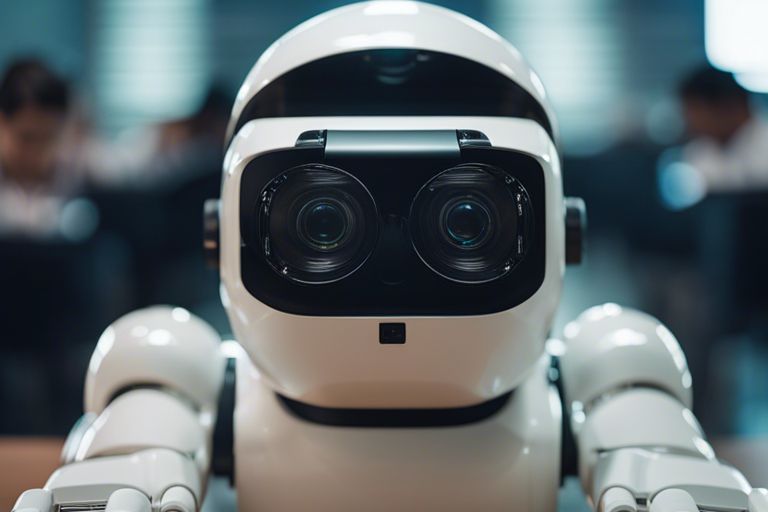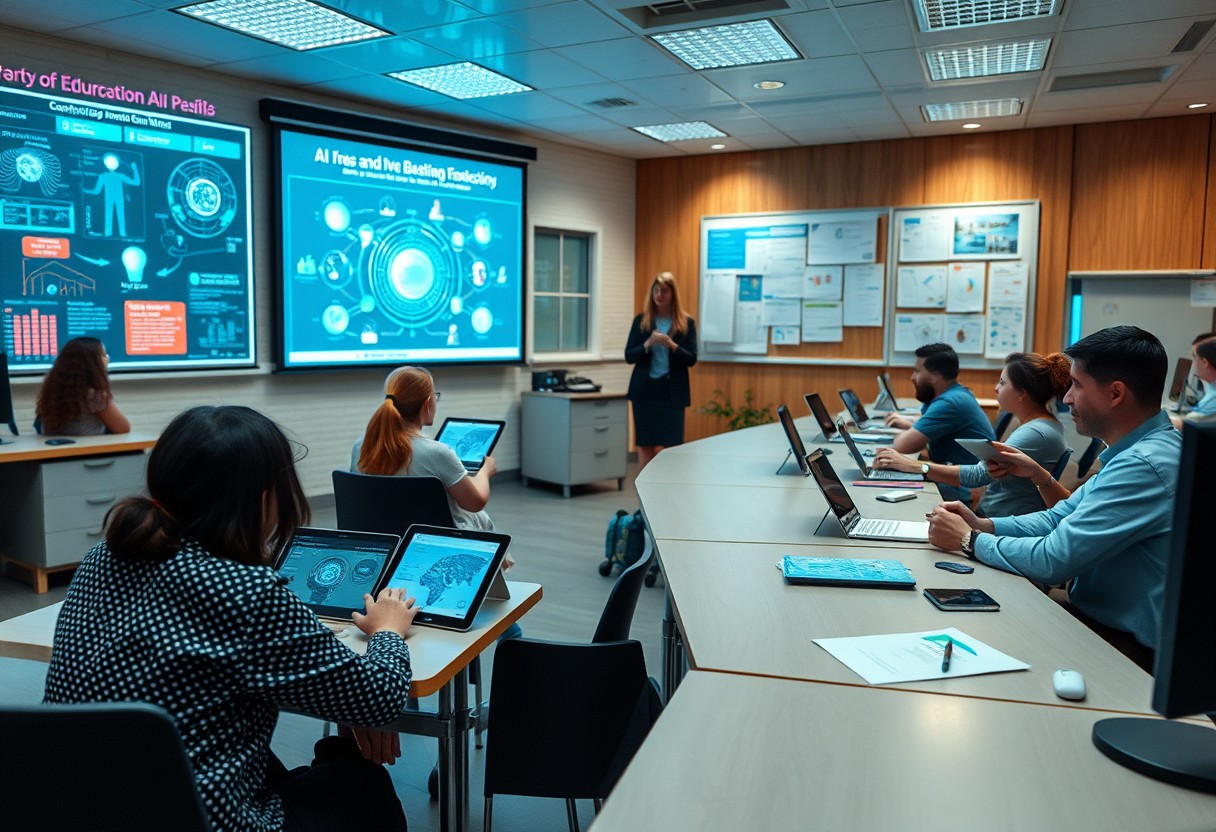Customized learning plans are revolutionizing education as AI technology personalizes the learning experience for each student. By analyzing individual strengths and weaknesses, AI adapts lesson plans to cater to specific needs, ensuring better academic outcomes. This tailored approach enhances engagement, retention, and overall learning efficiency. Discover how AI is transforming education by creating personalized pathways to success.
The Need for Personalization
One-Size-Fits-All Approach Limitations
Limitations in education often stem from a one-size-fits-all approach to teaching and learning. Traditional educational systems are designed to cater to the average student, leaving both struggling learners and advanced students without the necessary support and challenges. This approach fails to recognize the unique strengths, weaknesses, and learning styles of individuals, leading to disengagement, frustration, and underperformance.
The Rise of Individualized Learning
On the other hand, the rise of individualized learning acknowledges that each student is different and has unique educational needs. AI technology plays a crucial role in this shift, as it can analyze vast amounts of data to understand how each student learns best. By personalizing learning plans and adapting instruction in real-time, AI can optimize the learning experience for every individual, promoting engagement, motivation, and academic success.
Personalization in education has the potential to revolutionize traditional teaching methods, making learning more effective and enjoyable for students. By catering to each student’s strengths, interests, and pace of learning, personalized learning plans can boost student outcomes and create a more inclusive learning environment where every individual has the opportunity to thrive.
AI in Education
The Role of Artificial Intelligence in Learning
One of the most significant advancements in the field of education is the integration of Artificial Intelligence (AI) to personalize learning experiences. AI has the capability to analyze vast amounts of data to understand the strengths and weaknesses of individual students. This enables educators to create customized learning plans that cater to the specific needs of each learner, ultimately improving academic outcomes.
How AI Enhances the Learning Experience
Learning with AI goes beyond traditional one-size-fits-all approaches. AI algorithms can adapt in real-time to provide personalized support and feedback based on a student’s progress and performance. This level of individualized attention fosters engagement and motivation, leading to a more effective learning process.
It’s fascinating to see how AI can revolutionize the way we learn by tailoring educational content to match the unique learning styles and paces of each student. By harnessing the power of AI, educators can create dynamic and interactive learning environments that cater to the diverse needs of learners, ultimately maximizing their potential.
Adaptive Learning Technologies
Clearly, Adaptive Learning Technologies play a crucial role in tailoring educational experiences to meet the individual needs of learners. These technologies use artificial intelligence algorithms to analyze data and adjust the learning path in real-time, providing personalized support to students at every step of their educational journey.
Real-Time Assessment and Feedback
Any effective Adaptive Learning system incorporates real-time assessment and feedback mechanisms to track students’ progress and understanding. By continuously evaluating performance and providing immediate feedback, these systems help identify areas of strength and weakness, allowing for timely intervention and targeted support.
Dynamic Content Adjustment
Dynamic content adjustment refers to the ability of Adaptive Learning systems to modify the learning materials and activities based on individual student responses and performance data. The technology can automatically adjust the difficulty level of questions, provide additional explanations or resources, and offer personalized recommendations to optimize learning outcomes.
Dynamic content adjustment is a game-changer in education, as it enables educators to deliver tailored instruction to each student, regardless of their learning pace or style. By adapting the content in real-time, Adaptive Learning technologies ensure that students are always challenged at the right level and engaged in the learning process.
Identifying Individual Needs
All individuals have unique learning needs and preferences. AI technology plays a crucial role in identifying and addressing these specific requirements. By analyzing vast amounts of data, AI can create personalized learning plans that cater to the individual strengths and weaknesses of each learner.
Learner Profiling and Data Analysis
Profiling: AI algorithms analyze various data points such as previous academic performance, learning pace, strengths, weaknesses, and preferred learning methods. This detailed learner profiling allows AI to create precise learning plans tailored to the individual’s needs, ensuring effective educational outcomes.
Recognizing Learning Styles and Preferences
Learner: Understanding an individual’s learning style and preferences is vital for optimizing the learning process. AI can recognize patterns in how a learner absorbs information, whether visually, kinesthetically, or through auditory methods. By identifying and adapting to these preferences, AI can enhance the overall learning experience and improve retention rates.
Creating Customized Learning Paths
Your journey to mastery is unique, and AI is here to tailor your learning experience to fit your individual needs. By creating customized learning paths, AI ensures that you receive the most efficient and effective curriculum to reach your learning goals.
AI-Driven Curriculum Development
Any effective personalized learning experience begins with AI-driven curriculum development. This process involves analyzing your strengths, weaknesses, and learning style to create a tailored curriculum that maximizes your learning potential. AI continuously adapts the curriculum based on your progress and feedback, ensuring that you stay engaged and motivated throughout your learning journey.
Personalized Learning Objectives
Creating personalized learning objectives is crucial for your success. AI identifies your individual learning needs and sets specific, achievable goals to guide your learning process. These objectives are designed to challenge you while also ensuring that you make steady progress towards mastery.
Development Your personalized learning objectives may include mastering specific skills, completing practical projects, or achieving certain milestones within a set timeframe. By outlining clear objectives, AI keeps you focused and motivated, leading to greater learning outcomes.
Intelligent Tutoring Systems
Once again, we turn to the role of Artificial Intelligence in shaping customized learning plans through Intelligent Tutoring Systems. These systems are designed to adapt to individual needs by providing personalized support and guidance to learners.
Human-Like Interaction and Guidance
Intelligent Tutoring Systems are equipped with advanced algorithms that allow them to interact with learners in a human-like manner. They can analyze the student’s performance, understand their strengths and weaknesses, and provide tailored guidance accordingly. This personalized approach enhances the learning experience by catering to the specific needs of each individual.
Real-Time Support and Intervention
Guidance from Intelligent Tutoring Systems goes beyond just providing personalized feedback. These systems can also offer real-time support and intervention when a student is struggling with a concept. By detecting patterns in the student’s behavior and performance, the AI can step in to offer assistance and guidance immediately.
Another crucial aspect of real-time support and intervention is the ability of Intelligent Tutoring Systems to adapt their teaching strategies on the spot. If a student is not grasping a concept through one method, the system can quickly adjust and try alternative approaches to ensure comprehension.
Natural Language Processing in Education
Now, let’s research into how natural language processing (NLP) is revolutionizing education. NLP is a branch of artificial intelligence that helps computers understand, interpret, and generate human language. In the education sector, NLP tools are being used to enhance language learning, reading comprehension, and writing skills.
AI-Powered Language Learning Tools
One of the most significant uses of NLP in education is through AI-powered language learning tools. These tools utilize algorithms to analyze and interpret language patterns, providing personalized exercises and feedback to students. By tailoring learning materials to individual needs, students can improve their language skills more effectively and efficiently.
Enhanced Reading Comprehension and Writing Skills
Learning how to read and write effectively is crucial for academic success. AI-powered NLP tools can help students enhance their reading comprehension and writing skills by offering personalized recommendations for improvement. These tools can analyze students’ writing style, suggest vocabulary enhancements, and provide feedback on grammar and structure.
Enhanced reading comprehension and writing skills are imperative for students to excel in all subject areas. By utilizing AI-powered NLP tools, students can receive targeted support to enhance these critical skills, leading to improved academic performance and a deeper understanding of content.

Gamification and Engagement
Now, let’s research into how AI is revolutionizing the way we design educational games to enhance engagement and learning outcomes for individuals.
AI-Driven Game Design for Learning
An exciting development in educational technology is the use of AI algorithms to customize gameplay based on the individual’s learning style and progress. Through machine learning, AI can adapt the difficulty level, pacing, and content of games to optimize the learning experience for each student. By analyzing vast amounts of data on how students interact with the game, AI can provide personalized feedback and challenges in real-time, keeping learners engaged and motivated.
Increasing Motivation and Participation
Any educator knows that motivation is key to student success. AI-powered gamification strategies can significantly boost students’ motivation and participation by adding elements of competition, rewards, and instant feedback. By incorporating game-like elements such as points, badges, and leaderboards, AI can make learning more enjoyable and engaging for students, encouraging them to invest more time and effort into their educational tasks.
With gamification and AI working hand in hand, educators can create dynamic and adaptive learning environments that cater to the diverse needs of individual learners. By harnessing the power of technology to enhance engagement and motivation, personalized learning plans can truly transform the way we educate and empower students to reach their full potential.
Teacher-AI Collaboration
Augmenting Teacher Roles with AI
After the integration of AI into classrooms, teachers can now rely on intelligent systems to help them personalize learning experiences for each student. AI can analyze data and provide insights to educators, allowing them to identify areas where students may be struggling and need additional support. This technology can also suggest tailored learning resources and strategies that cater to individual learning styles.
Effective Human-AI Partnerships
On the other hand, collaborating with AI requires educators to develop new skills to effectively leverage the technology in the classroom. Teachers need to understand how AI algorithms work and interpret the data they provide to make informed decisions about their teaching practices. It is crucial for educators to maintain a balance between utilizing AI recommendations and their own expertise to ensure the best outcomes for their students.
Plus, establishing effective human-AI partnerships can lead to more personalized learning experiences, improved student outcomes, and increased teacher efficiency. By combining the unique strengths of both teachers and AI systems, schools can create a dynamic learning environment that caters to the diverse needs of students.
Overcoming Implementation Challenges
Not every educational institution finds it easy to implement AI-powered customized learning plans due to various challenges that may arise during the process. Addressing these challenges is crucial to ensure the successful integration of AI technology in education.
Addressing Technical and Infrastructure Issues
Challenges in this area may include outdated or incompatible systems, limited technical expertise among staff, and insufficient infrastructure to support AI implementation. To address these issues, educational institutions must invest in upgrading their technology infrastructure and providing adequate training for staff to ensure they can effectively utilize AI tools for personalized learning.
Change Management and Professional Development
With the introduction of AI in education comes the need for change management strategies and professional development programs. Institutions must focus on training and support for teachers to effectively integrate AI into their teaching practices. Additionally, clear communication about the benefits of AI in personalized learning and ongoing support for educators can help foster a positive attitude towards technology integration in the classroom.
Ensuring Equity and Accessibility
AI-Driven Solutions for Diverse Learners
Keep in mind that each learner has unique needs and preferences when it comes to education. AI-driven solutions can help bridge the gap by providing personalized learning experiences tailored to individual learning styles, abilities, and interests. For diverse learners such as those with disabilities or English language learners, AI can offer customized resources, adaptive feedback, and alternative communication methods to ensure they have equal access to quality education.
Promoting Inclusive Learning Environments
On the journey to creating inclusive learning environments, it is crucial to consider the diverse backgrounds and experiences of all learners. It is necessary to provide equitable opportunities for every student to succeed, regardless of their socio-economic status, race, or physical abilities. By leveraging AI technologies, educators can identify and address potential barriers to learning, promote diversity and inclusion, and foster a supportive learning environment where all students feel valued and empowered.
It is imperative that educational institutions prioritize equity and accessibility to ensure that all individuals have the opportunity to thrive academically. By embracing AI-driven solutions and promoting inclusive practices, we can create a more equitable and accessible educational landscape for learners of all backgrounds and abilities.
Evaluating Effectiveness and Impact
Despite the advancements in AI technology to personalize learning plans, it is crucial to evaluate their effectiveness and impact on the individual learner. This assessment helps in ensuring that the AI-driven learning plans are meeting the intended goals and making a positive difference in the educational journey.
Measuring Learning Outcomes and Progress
One way to evaluate the effectiveness of AI-driven customized learning plans is by measuring the learning outcomes and progress of the learners. This involves tracking key metrics such as improved grades, enhanced comprehension of subjects, and increased engagement with the learning material. By analyzing these indicators, educators and AI developers can gain valuable insights into the efficacy of the personalized learning approach.
Assessing AI-Driven Learning Plan Efficacy
For a comprehensive assessment of the impact of AI-driven learning plans, it is crucial to assess their efficacy in comparison to traditional teaching methods. This evaluation can involve conducting controlled studies to measure the performance outcomes and retention rates of students following personalized learning plans versus those following a standard curriculum. Such comparative analysis helps in determining the strengths and areas for improvement of AI-driven learning plans.
Plan: It is important to consider both short-term and long-term effects when assessing the efficacy of AI-driven learning plans. Additionally, feedback from students and educators can provide valuable information on the usability and effectiveness of personalized learning approaches.
Future Directions and Possibilities
Emerging Trends in AI-Driven Education
Unlike traditional teaching methods, AI-driven education is constantly evolving to meet the individual needs of students. One emerging trend is the incorporation of AI-driven virtual reality and augmented reality experiences to provide immersive learning environments. These technologies have the potential to revolutionize how students engage with educational content, making learning more interactive and engaging.
Potential Applications and Expansions
Emerging from personalized learning plans, AI could further revolutionize education by expanding its applications across various subjects and levels of education, from K-12 to higher education and beyond. With the ability to analyze vast amounts of data and provide real-time feedback, AI has the potential to transform not only how students learn but also how educators teach.
To fully unlock the potential of AI in education, it will be imperative for schools and educational institutions to invest in training teachers and staff to effectively integrate AI tools into the curriculum. By embracing these technological advancements, educators can create more personalized learning experiences that cater to the specific needs of each student.
1. Tailored learning experiences based on individual needs and progress.
2. Personalized content and pace for each learner.
3. Continuous assessment and adjustment for optimal learning outcomes.
4. AI analyzes data to provide targeted recommendations and support.
5. Focus on student engagement and motivation.
6. Flexibility to accommodate different learning styles and abilities.
Conclusion
From above, we have explored how artificial intelligence can create customized learning plans that adapt to individual needs. This innovative approach allows for personalized education experiences that cater to each student’s strengths, weaknesses, and learning styles. By harnessing the power of AI, educational institutions can provide more effective and engaging learning experiences for their students.
Lastly, the integration of AI into education has the potential to revolutionize how we learn and grow. As technology continues to advance, it is important for educators to embrace these tools to tailor learning experiences that meet the unique needs of each student. By leveraging AI to create customized learning plans, we can improve educational outcomes and enhance the overall learning experience for students of all ages.
FAQ
Q: What are customized learning plans?
A: Customized learning plans are personalized educational strategies tailored to meet the individual needs of each learner.
Q: How does AI adapt to individual needs in customized learning plans?
A: AI utilizes data analytics and algorithms to analyze each learner’s strengths, weaknesses, and learning styles, allowing for the adaptation of teaching methods to suit their specific requirements.
Q: Why are customized learning plans important?
A: Customized learning plans are vital as they enhance the learning experience by catering to the unique needs of each student, ultimately improving academic performance and engagement.
Q: How does AI gather data to create customized learning plans?
A: AI collects data through various means such as online assessments, quizzes, interactive learning platforms, and even wearable devices to track the progress and preferences of learners.
Q: Can AI provide real-time feedback in customized learning plans?
A: Yes, AI can offer immediate feedback on assignments, quizzes, and assessments, enabling learners to address their mistakes promptly and make necessary improvements.
Q: What role do teachers play in customized learning plans with AI?
A: Teachers play a crucial role in overseeing and interpreting the data provided by AI to further personalize learning plans, offer additional support, and create a collaborative learning environment.
Q: How can AI-powered customized learning plans benefit learners with diverse needs?
A: AI-powered customized learning plans can adapt to the unique requirements of learners, including those with learning disabilities, language barriers, or advanced skills, catering to a diverse range of educational needs.




